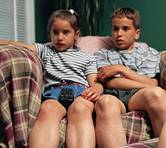- The Best Time of Day to Drink Bone Broth to Maximize Health Benefits
- 8 Ways to Increase Dopamine Naturally
- 7 Best Breads for Maintaining Stable Blood Sugar
- Gelatin vs. Collagen: Which is Best for Skin, Nails, and Joints?
- The Long-Term Effects of Daily Turmeric Supplements on Liver Health
- Could Your Grocery Store Meat Be Causing Recurring UTIs?
- Are You Making This Expensive Thermostat Error This Winter?
- Recognizing the Signs of Hypothyroidism
- 10 Strategies to Overcome Insomnia
- Could Artificial Sweeteners Be Aging the Brain Faster?
Just 1.5 Hours of TV a Day May Disrupt Kids’ Sleep, Study Says


Kids who watch as little as 1.5 hours of TV a day may get less sleep than those who don’t watch as much television, according to a new study from Spain.
Moreover, as overall TV-watching increases, essential sleep time declines, the study of more than 1,700 youngsters found.
“Television could modify the level of sleep in young children,” said lead researcher Marcella Marinelli, who’s with the Center for Research in Environmental Epidemiology, in Barcelona. Reduced sleep could be a risk factor for obesity and behavioral problems such as attention-deficit hyperactivity disorder, she added.
It’s known that TV-watching affects many functions in children, including school performance, weight and development, added Dr. Adriana Cadilla, a pediatrician at Miami Children’s Hospital in Florida.
The remedy is to not use TV as a babysitter, to limit the amount of TV kids watch, and monitor the programs they see, these experts said.
There are many unknowns when it comes to kids and media, such as how much is too much and the effect of content on children, Cadilla said.
“There are lots of theories. One is that lots of bright colors can overexcite kids just before going to bed. There’s a lot of violence — even in cartoons, which could affect sleep,” she said.
Because information on the content of the television programs was lacking for the Spanish study, it’s not possible to say for sure that specific types of TV shows influence sleep. Also, data wasn’t available on the timing of TV-watching or children’s physical activity levels, which might affect sleep quality, too.
Still, parents should offer alternatives to TV, involving their children in different social activities such as sports or music, or just spending family time together, Marinelli said.
“Some educational cartoons or movies could help children improve their language skills and should be used for educational purpose, but parents should stay with their children and stimulate them during viewing,” said Marinelli.
The report’s findings were published in the March 10 online edition of JAMA Pediatrics.
Cadilla said the study highlights the need for parents to limit TV. The American Academy of Pediatrics also recommends limiting all types of media, including computers, video games, iPads and smartphones. The recommendation calls for no screen time for children under 2 years of age, and no more than one to two hours a day for kids older than that.
Also, keep televisions and other media out of children’s bedrooms, Cadilla said. “The lack of TV or video games in a child’s bedroom will help their sleep habits,” she said.
Setting media “timeouts” — when there is no TV or other media allowed — or establishing a media-free zone can also help curb screen time, Cadilla said. “And don’t watch TV while having dinner,” she added.
For the study, Marinelli’s team questioned parents of slightly more than 1,700 preschool and school-aged children about the time their kids spent watching TV and sleeping (including napping) each day. The preschoolers were 2 and 4 years old at the study’s start, the others were 6 and 9.
The researchers found that children who watched TV for 1.5 hours or more a day slept less than kids with less TV time. And as viewing time increased to more than 1.5 hours a day, sleep declined even more.
Most of the children were followed-up four years later, and the same patterns emerged for weekday as well as weekend viewing, the researchers found.
At the follow-up of the 6- and 9-year-olds, those children whose TV-watching increased to more than 1.5 hours daily slept 20 percent less than when first seen, the researchers found.
However, “children who reduced the amount of time spent in front of the television had some recovery of sleep duration,” Marinelli said.
According to the National Sleep Foundation, preschoolers typically sleep 11 to 13 hours each night, and most give up napping by age 5. Children ages 5 to 12 need about 10 or 11 hours of sleep.
More information
For more information on kids and TV, visit the University of Michigan Health System.
Source: HealthDay
Copyright © 2026 HealthDay. All rights reserved.










